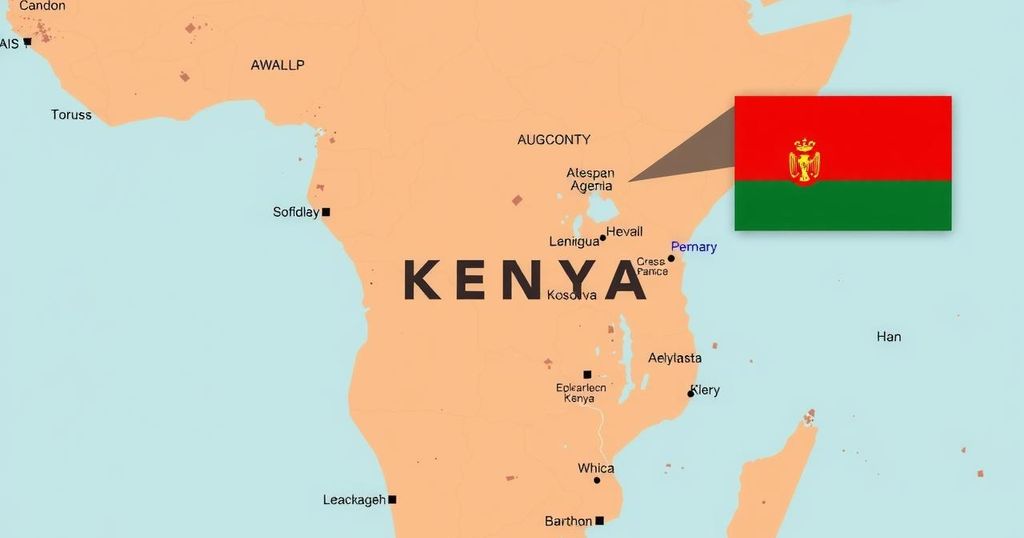Kenya Officially Recognizes Kosovo’s Independence in Diplomatic Breakthrough
Kenya has officially recognized Kosovo’s independence, an important diplomatic achievement after five years of stalled efforts. This decision, announced by President William Ruto, is expected to enhance Kosovo’s international standing and encourage other African nations to reconsider their positions. Former Kosovan President Behgjet Pacolli played a vital role in this recognition process, which is anticipated to lead to stronger ties between Kenya and Kosovo.
Kenya has officially recognized Kosovo as an independent state, a pivotal diplomatic milestone after a five-year period of stalled recognition efforts. This announcement was made by President William Ruto on March 26, 2025, and is regarded as a significant advancement for Kosovo’s international status and its relationships with African nations.
Kenya’s recognition of Kosovo marks the first such acknowledgment in five years, following a time of restricted international support. The decision was influenced by ongoing diplomatic dialogues between leaders from Kenya and Kosovo, supporting Kosovo’s quest for international legitimacy following its declaration of independence from Serbia in 2008, which remains a contentious matter internationally due to opposition from Serbia and its allies.
Background information reveals that Kosovo’s declaration of independence on February 17, 2008, has received recognition from over 110 countries, including major powers like the United States and most European Union member states. However, Kosovo continues to face challenges in securing widespread recognition due to opposition primarily from Russia and China, both of which wield veto power within the United Nations.
The process by which Kenya recognized Kosovo involved several key diplomatic engagements. Former Kosovan President Behgjet Pacolli was instrumental in advocating for recognition, completing multiple visits to Kenya since 2009. The official recognition was celebrated during a ceremony held in Nairobi, where top officials from both nations were present. In his decree, President Ruto reaffirmed Kenya’s dedication to advancing international peace and security and enhancing connections with Balkan states.
Reactions to Kenya’s recognition have been largely positive within Kosovo. President Vjosa Osmani expressed profound appreciation for this decision, recognizing it as a significant milestone in Kosovo’s efforts for greater international acknowledgment. Behgjet Pacolli hailed the event as a historic achievement for Kosovo, encouraging the country to formalize its diplomatic relations and establish an embassy in Kenya.
The implications of Kenya’s acknowledgment of Kosovo are profound. It is anticipated that Kosovo will seek to establish formal diplomatic ties with Kenya, fostering collaboration across various sectors, including trade and cultural exchanges. Furthermore, this move may prompt other African nations to reevaluate their stances on Kosovo, potentially leading to an increase in official recognitions. Additionally, the decision counters Serbia’s lobbying efforts across Africa, which have traditionally aimed to inhibit Kosovo’s recognition.
In conclusion, Kenya’s official recognition of Kosovo serves as a landmark event that not only enhances Kosovo’s international profile but signifies a notable shift in diplomatic relations between Africa and the Balkans. As Kosovo continues its pursuit for broader acknowledgment, this development may unlock opportunities for new partnerships and collaborations on the global landscape.
In summary, the formal recognition of Kosovo by Kenya represents a significant diplomatic achievement, enhancing Kosovo’s international visibility and fostering deeper relationships with African nations. This pivotal decision may stimulate recognition initiatives from other nations and counter Serbia’s influence within Africa, promoting further diplomatic engagement and cooperation going forward.
Original Source: balkaneu.com




Post Comment